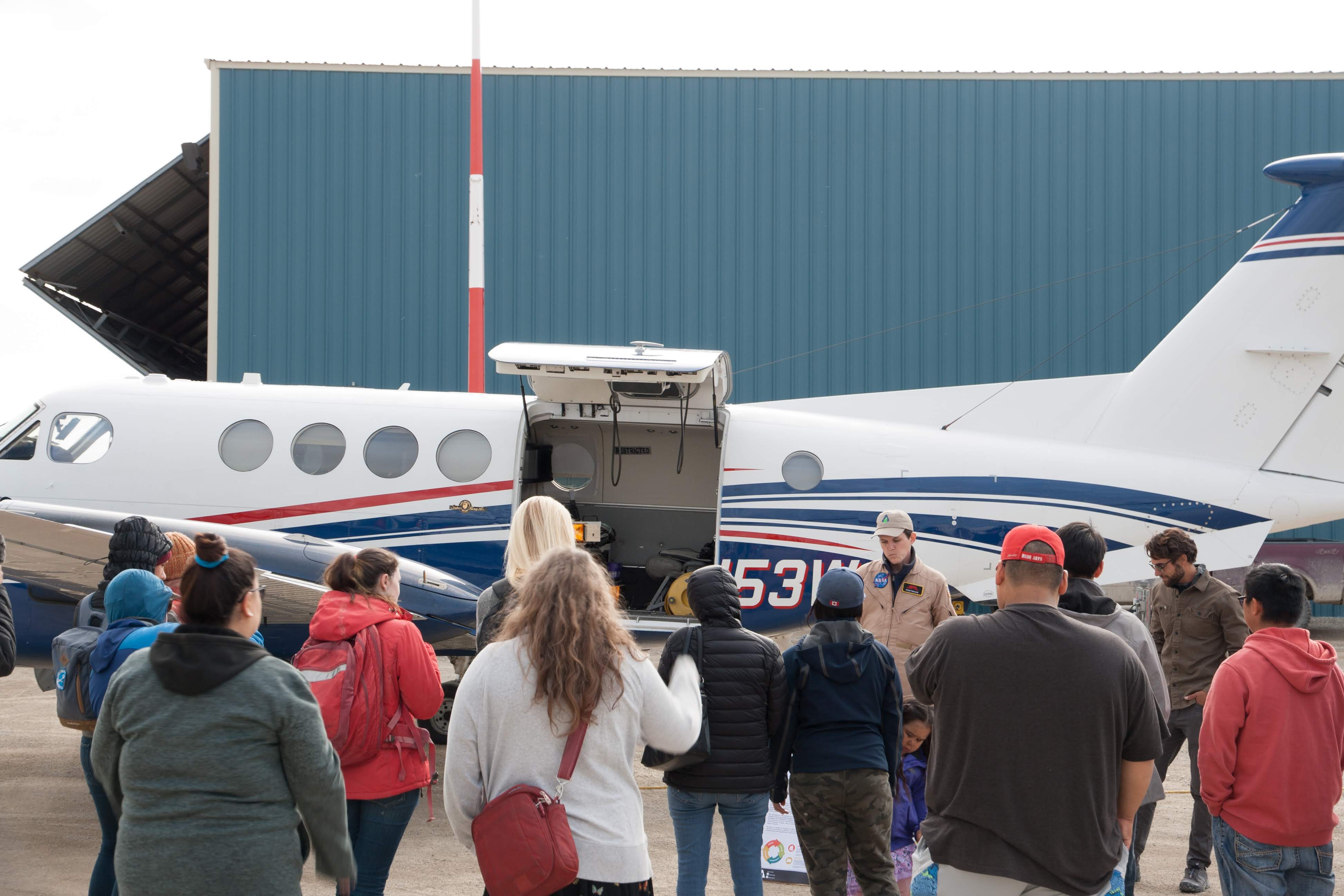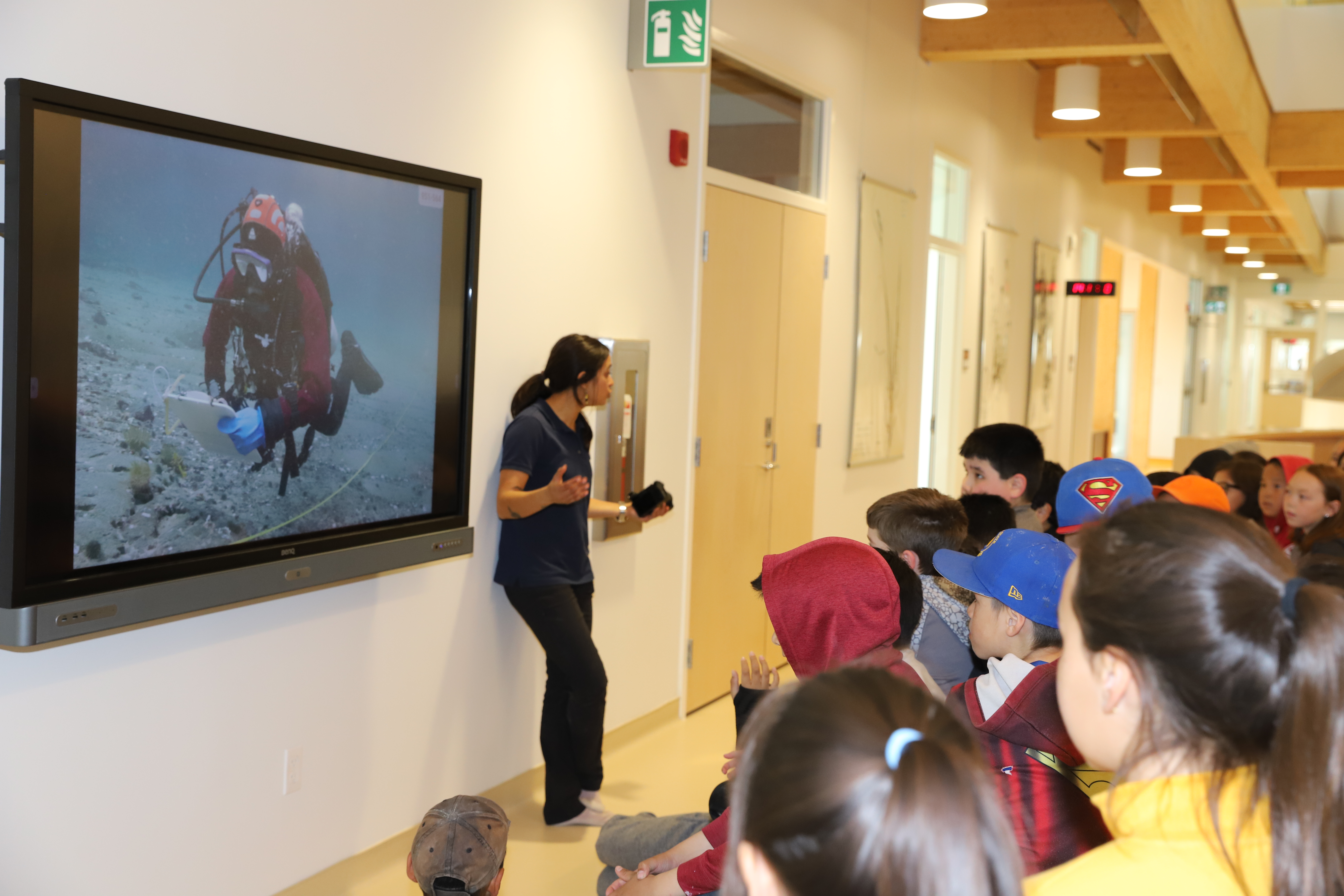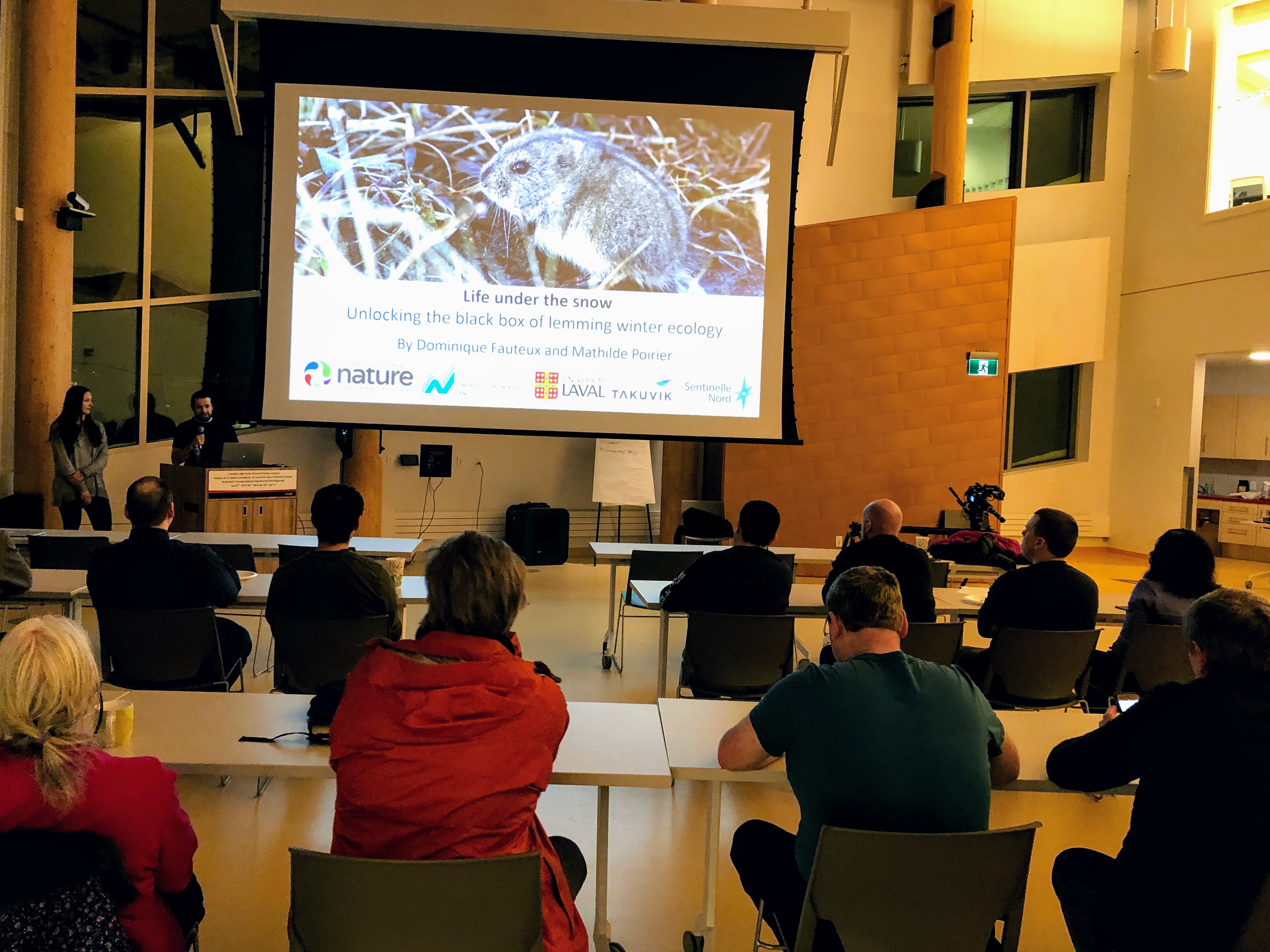Knowledge mobilization and community engagement at the Canadian High Arctic Research Station Campus, Cambridge Bay, Nunavut
Authors
- A.M. Balasubramaniam, Polar Knowledge Canada, Canadian High Arctic Research Station, Cambridge Bay, Nunavut, Canada, ann.balasubramaniam@polar.gc.ca
- L. Orman, Polar Knowledge Canada, Canadian High Arctic Research Station, Cambridge Bay, Nunavut, Canada
Citation information
Balasubramaniam, A.M. and Orman, L. 2020. Knowledge mobilization and community engagement at the Canadian High Arctic Research Station Campus, Cambridge Bay, Nunavut. Polar Knowledge: Aqhaliat Report, volume 3, Polar Knowledge Canada, p. 72–76. DOI: 10.35298/pkc.2020.18.eng
Article
There is a growing impetus for researchers working in the Canadian Arctic to share knowledge and research findings with Northerners to build local capacity, inform decision making, and improve community understanding of environmental changes within their homelands. Community focused research presentations also have a number of benefits for researchers, including the potential for improved research relationships with Indigenous knowledge holders, improved research outcomes when local and traditional knowledge from the community is shared in a two-way exchange, and facilitated fulfillment of research licensing processes around community engagement. Indeed, the reporting of findings in accessible formats to enable dialogue and community feedback is an important step when discussing ethics for northern research as highlighted by Indigenous organizations and northern research institutes (Cultural Services Branch, 2013; Ikaarvik Ocean Wise, 2018; Nickels et al., 2006; Aurora Research Institute, 2011).
In recognition of the numerous benefits of researcher-community knowledge exchange, Polar Knowledge Canada (POLAR) has launched a Public Speakers Series at the Canadian High Arctic Research Station (CHARS) campus that will act as a forum for researchers, Indigenous knowledge holders, youth, and community members, to share knowledge and interact in creative ways. The main objective of this pilot series is to mobilize knowledge from the research occurring at the CHARS campus to the community of Cambridge Bay via interactive demonstrations and plain-language presentations that are accessible, informative, and that stimulate a two-way knowledge exchange. Researchers are encouraged to develop interactive audio visuals, refine slide content to plain-language text and visuals, and create physical displays of materials that demonstrate research methods for community members to interact with. Each speaker series event to date has consisted of at least two speakers sharing different components of a research initiative and highlighting the interdisciplinary nature and complexity of knowledge creation initiatives occurring at CHARS.
In late 2019, after the official grand opening of the CHARS campus, the Public Speakers Series began, featuring the following talks:
- Arctic-Boreal Vulnerability Experiment (ABoVE): A POLAR and NASA collaboration (Figure 1);
- Explore Marine Life through SCUBA Diving in Kitikmeot Region of Nunavut: A POLAR and Ocean Wise Conservation Association / Vancouver Aquarium collaboration (Figure 2); and
- Exploring the link between climate change and wildlife in polar environments: A POLAR, Canadian Museum of Nature, British Broadcasting Corporation (BBC), Reel Youth documentary film ventures collaboration (Figure 3).
More information on the Public Speakers Series is outlined in Table 1.
Enabling community involvement in research and inspiring the next generation of polar researchers remain key priorities of POLAR and can be enhanced through strong and creative partnerships. POLAR looks forward to continuing its Public Speakers Series at CHARS in 2020, as well as enabling other knowledge sharing events that highlight Indigenous knowledge, scientific research, and complementary ways of knowing, at a community level, across Canada's North.
Acknowledgements
The Public Speakers Series would not have been possible without the support of local organizations. We are appreciative of the support The Municipality of Cambridge Bay, Kullik Ilihakvik Elementary School, Kiilinik High School, The Cambridge Bay Day Care Society, and the Nunavut Arctic College – all of which promoted and supported staff and student attendance.

Figure 1: The public tour of the NASA AVIRIS aircraft at CHARS to interactively engage community members in ABoVE's work.

Figure 2: Youth receiving a guided slide show, featuring pictures from SCUBA research in arctic oceans.

Figure 3: Full house at the CHARS campus for presentations regarding wildlife and climate change, featuring the Canadian Museum of Nature's Dominique Fauteux.
Table 1 Overview of POLAR's pilot Public Speakers Series.
| Public Event | Speaker Affiliations | Interactive Component | Speakers | Total Attendance (estimate) |
|---|---|---|---|---|
| 1 | POLAR NASA ABoVE | NASA AVIRIS Viewing at the Airport | Donald McLennan and Phil Townsend | 100 |
| 2 | Ocean Wise Conservation Association/Vancouver Aquarium | Touch tanks with live marine animals, SCUBA equipment interactive displays, slide shows with interpreter | Jeremy Heywood and Neha Acharya-Patel | 295* |
| 3 | British Broadcasting Cooperation (BBC), Canadian Museum of Nature, and Reel Youth | Filming equipment used by the BBC, small mammal snow tunnels, film viewing and Elder commentary | Jane Atkins, Dominique Fauteux and Mathilde Poirier, Mark Vonesch, Annie Panak Atighioyak (Elder) | 65 |
* Note: Numbers included elementary school students who participated in interactive components of the event, including live animal tanks.
References
- Cultural Services Branch, Department of Tourism and Culture, 2013. Guidebook on Scientific Research in the Yukon. Government of Yukon Publication.
- Ikaarvik and Ocean Wise, 2018. Research and Meaningful engagement of northern Indigenous communities: Recommendations from the Ikaarvik Youth ScIQ Summit, November 19-23, 2018, Cambridge Bay, Nunavut.
- Nickels, S., Shirley, J., and Laidler, G., 2006. Negotiating research relationships with Inuit communities: A guide for researchers, rev. ed. Ottawa and Iqaluit: Inuit Tapiriit Kanatami and Nunavut Research Institute.
- The Aurora Research Institute, 2011. Doing Research in the North West Territories: A guide for researchers applying for Scientific Research Licence, 10.
Polar Knowledge Canada
For media inquiries, contact:
communications@polar-polaire.gc.ca
Page details
- Date modified: